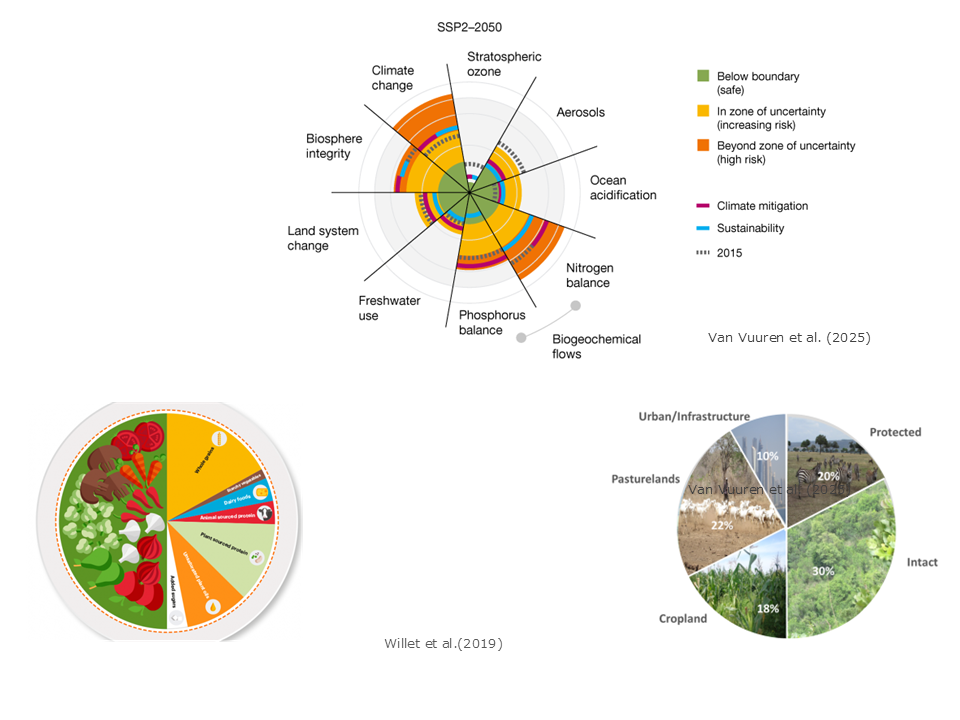Pick Up
1313. Planetary Boundaries and Planetary Health

1313. Planetary Boundaries and Planetary Health
Earth system scientists have developed the planetary boundaries framework to measure and track the stability and resilience of the Earth system, quantifying safe zones for nine processes increasingly affected by human activities. Six of these nine planetary boundaries have already been exceeded. In parallel, health scientists are concerned that Earth system change threatens the conditions underlying human health and well-being. These concerns have given rise to planetary health research, a solutions-oriented interdisciplinary field and social movement focused on analyzing and addressing the impacts of human disruption to Earth's natural systems on human health and all life on Earth.
An editorial published in The Lancet made the following four proposals for closer integration of planetary boundaries and planetary health research:
First, Earth system destabilization fundamentally threatens human health. There is ample evidence that each of the Earth system changes tracked by the planetary boundaries framework impacts human health in multiple ways, including noncommunicable diseases, food and nutrition, infectious diseases, reproduction, maternal and child health, and mental health. Close collaboration between the planetary boundaries and planetary health communities will enable systematic investigation of the human health impacts of Earth system change and its interactions. However, concepts, indicators, and data from Earth system science and environmental epidemiology do not always align. Assessing health risks to planetary boundaries through a coherent approach, translating knowledge across disciplines and spanning the entire causal chain from Earth system change to health impacts, requires truly interdisciplinary collaboration. This requires a permanent platform for global information exchange and ambitious cross-sector funding.
Second, justice plays a central role in protecting health within planetary boundaries. While the health impacts of environmental change affect all people and societies on Earth, they disproportionately affect future generations, indigenous peoples, low-income communities, and other marginalized groups who tend to be least responsible for Earth system destabilization. Ensuring universal access to essential resources like food and water for the most vulnerable without further straining the Earth system is essential, and all efforts to stabilize Earth's natural systems should be carefully evaluated to ensure that burdens and benefits are equitably distributed. While the health community has long emphasized equity and justice, the planetary boundaries framework has only recently been evaluated from a justice perspective, as defined by the "safe and just Earth system limits" framework.
Third, we need to consider the true benefits and costs of policies. Collaborative efforts between the Earth system and health communities can internalize previously unaccounted health impacts of environmental change and more accurately quantify the health benefits that nature provides to people (e.g., mitigating the negative effects of climate change and pollution, suppressing pests, and providing food, medicines, and identity). For example, transforming the global food system has the potential to eliminate the hidden health costs of the current food system and significantly reduce the costs to the Earth system. Rigorous accounting of true benefits and costs, as well as comprehensive monitoring of environmental change and its health impacts, will also play a key role in implementing new economic approaches that apply a range of metrics beyond gross domestic product.
Finally, integrated science communication is needed to broaden support for change. Such communication can raise awareness that protecting human health requires ambitious and urgent efforts to stabilize the earth system, which in turn necessitates rapid structural and transformative changes in most aspects of human activity, from food, health, and energy systems to the design of cities and economies. Overcoming the intertwined root causes of environmental, health, and justice crises requires changing the mindsets that created them and embracing the interconnectedness of all people and nature.
(Reference)
Myers, Samuel S et al. 2025, Connecting planetary boundaries and planetary health: a resilient and stable Earth system is crucial for human health. The Lancet, Volume 406, Issue 10501, pp. 315–319
https://www.thelancet.com/journals/lancet/article/PIIS0140-6736(25)0125…
Contributor: IIYAMA Miyuki, Information Program
